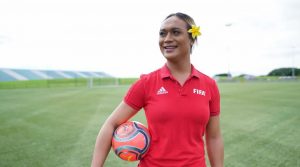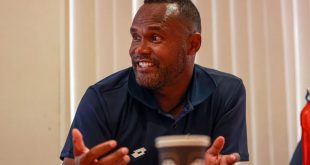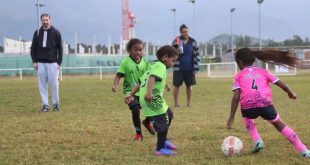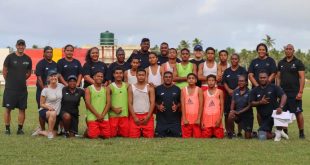 American Samoa footballer Jaiyah Saelua has been a trailblazer for inclusivity in football. The first openly non-binary and trans woman to compete in a Football World Cup qualifier, is in Auckland, New Zealand this week as an ambassador for the Rainbow Games. Rainbow Games | Tāmaki Makaurau Auckland NZ 2024
American Samoa footballer Jaiyah Saelua has been a trailblazer for inclusivity in football. The first openly non-binary and trans woman to compete in a Football World Cup qualifier, is in Auckland, New Zealand this week as an ambassador for the Rainbow Games. Rainbow Games | Tāmaki Makaurau Auckland NZ 2024
The American Samoa national team defender chatted to OFC about her journey in football, which has led to her becoming a FIFA legend. She discusses the impact being portrayed in the Taika Waititi Hollywood movie ‘Next Goal Wins’ has had on her and her cause.
Many people watching will recognise you, or at least your character in the Taika Waititi movie, ‘Next Goal Wins’. What was it like for you watching it for the first time?
It was almost surreal. I’ve had experience with American Samoa being in the limelight because of the documentary that came out in 2014 about our national team but Hollywood films have a reach that I could have never imagined and being able to tell my story and being able to elevate the female identity, bits of the Samoan culture really helped me to open my eyes to the possibilities of how far this platform could take me.
And I’m just honoured to be able to be somewhat of a spokesperson for my culture and the Fa’afafine community, helping hopefully to shed some light on our realities of struggles but also how we are celebrated in our culture and how a lot of Western societies can learn something about little parts of the world that they aren’t necessarily accustomed to.
Let’s talk about your football because that’s really why you’re here and ambassador for the Rainbow games which is on an Auckland this weekend, the football tournament on Sunday. When did the journey in football start for you?
You know when I was 11 years old, I started playing football, it was basically the only competitive sport that was offered at school. We took the Championship title that first year in competition and I was named the island wide most valuable player. I wasn’t an out Fa’afafine at the time, but that was the spark that I needed to go on this journey that has taken me to parts of the world I have only have dreamed of going to.
Football has the ability to make dreams come true. Despite your background, despite where you come from, your economic status, your religious views, your gender identity, your sexual orientation, and the ability of football to transcend all of those things that would be considered stigmas in many parts of the world. I think that was the most appealing thing for me growing up in football and being more involved with the sport and all the opportunities that were offered to me as not only a fa’afafine, but someone who would be considered a transgender woman in a lot of parts of the world.
2011 of course, a special time for you as part of that American Samoa team that inspired (the movie) Next Goal Wins. How has the publicity from the movie helped you promote acceptance, diversity, and how has things changed in the last decade?
Being a Fa’afafine in Samoan culture is almost second nature. It’s not something that we pursue, talk about. It’s just how things are. And so, I was completely oblivious to the need for someone who could be a voice on the international level, who could be a figure of hope and of inclusivity. I quickly realised that if, no one was given this opportunity, and it basically fell in my lap in 2011, then why not pursue it and make something of it. And since then, lots has happened. I’ve been on FIFA’s radar since and I’ve been given a lot of opportunities, and I guess you could say that is my privilege to be given opportunities that a lot of Fa’afafine before me and after me haven’t been afforded. Things like being on the cover of the FIFA magazine, September 2016 issue, being invited by the president of FIFA to the Women’s World Cup, just last year, being named the FIFA legend, sitting on the panel for diversity, there were only 11 in the world, things like that, that would be considered ground-breaking, and all it took was for me to be myself. So I think a lot of the visibility that I was able to achieve is due in part to my culture and my people, but also the opportunities that FIFA have given me.
Have you seen kids or young people who may be fa’afafine as a result of what you’ve achieved, get involved in football and start to play?
I think the more of my story was out in the world, the farther the reach of my story has, gone, the more I get messages on social media from people who aren’t Samoan people, athletes who are non-binary, youth who are in the early stages of their transition, but who still have a passion for football. The visibility of my story and the platform’s ability to reach so many people around the world has inspired a lot of youth especially but before Taika Waititi’s version of Next Goal Wins came out, a lot of young fa’afafine’s have come up to me in American Samoa and have, not as fans but as young people who have been inspired. And I could think of about four young fa’afafine, two of them from my local club who have come out being fa’afafine , but also very passionate about football. So I think if we people with platforms, and with the power to influence can change at least one or inspire at least one person in the world before we retire from whatever it is that we do, then we have made the world a better place.
How do you think football can promote social inclusion in society?
Football because it’s such a huge sport in the world, it’s the most organised sport in the world with, you know, the power to influence change in governments. And as we’ve seen, a lot of the Middle Eastern countries have been hosting a lot more international tournaments. Every time that they host, they adopt more policies that are inclusive of more diverse people. And, think that’s the power of football. Because it’s global, and it transcends a lot of the stigmas that people who would be considered poor people who are in the LGBTQI community, women, the development of women has come a long way, you know, things like that, where, for many, many years, the majority of the years that football has been an organised sport in the world. It has been dominated by men, and the more diverse football is on the global scale, and the more opportunities that are afforded to minorities, the bigger the influence it has on government. So I think that’s the biggest influence that football has in the world.
You mentioned that you’re coming towards the end of your playing career. I know you’ve got another World Cup qualifier to aim for this year. When you hang up the boots, do you want to stay involved in football?
I will always be involved in football at some capacity. I can’t imagine stepping away from the sport completely. It’s been a huge part of my life since I was a young age. And it has taken me to places and given me experiences and opportunities that I could have never imagined. So I feel like I owe it to myself but also to the sport to keep developing it. Locally and internationally.. The older I get the more I realise that I’m not going to be able to play as competitively as I used to, and especially being a trans woman, needs to focus a lot on my transition the reality is, the older I get the harder it would be to continue my transition. So, I see myself maybe as a coach for the national team, some national team in American Samoa, maybe refereeing, I’ve done some refereeing. It’s a little more difficult to venture into refereeing because as an athlete, you’re focused on you know, we clashed a lot with referees, then I almost don’t want to be the enemy of the players. So, if there are any opportunities for me to still be involved in football, it would be as a coach.
What’s your message to a young person who is now starting to go through perhaps what you went through. Thanks to your efforts, and others, of course, is there a lot more acceptance and an understanding?
Progress is inevitable. I am a product of the struggles that people that have come before me. I have a lot of privileges in my experiences, because of the people who came before me. And I think my job is to continue that progress. And the youth now have a lot more opportunities not only to play, but to be themselves, and growing up in American Samoa, one of my privileges was growing up in a society and a culture that accepts me for being a fa’afafine. And I want to use that to help others, especially youth, other people who are like myself, non-binary, transgender, LGBTQI + to realise that there are opportunities in football and a lot more now, than what were afforded to me, growing up in football. So again, progress is inevitable you will get to enjoy privileges when the time comes. As long as you stay true to your passion to play football and develop as a player but also never losing sight of who you are inside.
 Arunava about Football A look at football & the world through my eyes!
Arunava about Football A look at football & the world through my eyes!



